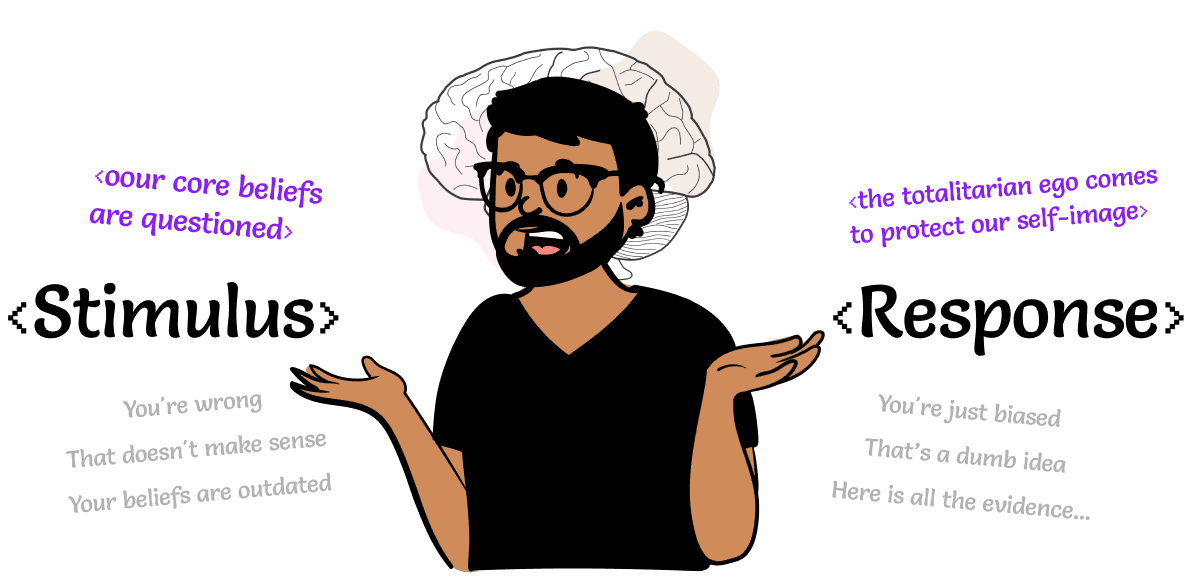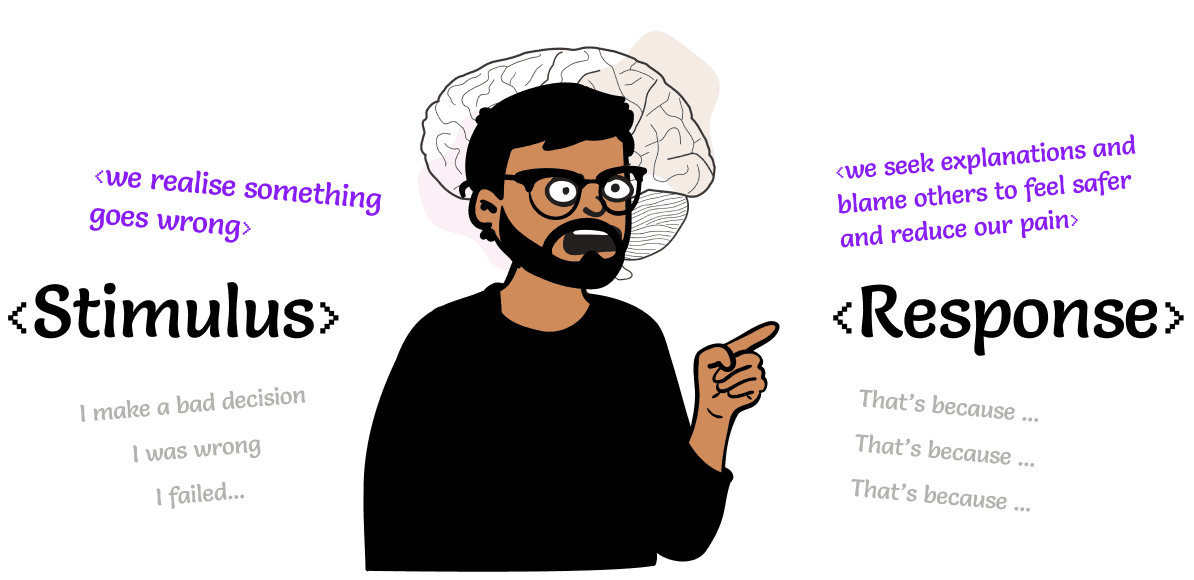1. The Law of Irrationality: Master Your Emotional Self

We are all prone to irrational behaviour.
When our core beliefs are challenged, we often shut down instead of opening up. It's like there's a dictator living inside our heads, controlling the flow of facts to our minds. Psychologists call this the"totalitarian ego"— its job is to keep out threatening information.
This defensive mechanism activates the brain's hot fight-or-flight response, flooding us with visceral anger and fear.It feels as if our mind has been punched.
In response, the totalitarian ego steps in, offering mental armour to protect our self-image by feeding us comforting lies.
It's easy to see how an inner dictator comes in handy when someone attacks our character or intelligence or identity or opinions.

Whenever we realise anything goes wrong in our life, we naturally seek an explanation.
However, in looking for a cause, our minds tend to revolve around the same types of explanations:
- Someone or some group sabotaged me, perhaps out of dislike
- Larger forces like the government or societal norms hindered me
- I received bad advice
- Information was kept from me
So we look outward for the cause and blame others to feel safer and reduce our pain.
The following three steps will help us begin on the path toward rationality:
Step one: Recognise the biases
There will be more to cover in future books if you are interested...
Step two: Beware the inflaming factors
Step three: Strategies toward bringing out the rational self
2. The Law of Narcissism: Transform Self-love into Empathy

Humans are social beings with a natural need for attention, and we all have some degree of narcissism. Some fall deeper on the spectrum than others.
At the extreme end of the spectrum, those withdeep narcissismsee attention as essential to their survival.
They are highly self-centred, lack awareness of others' needs, emotions, and perspectives. They have difficulty accepting criticism and tend to exploit relationships, manipulating or using others for personal gain.
Most people fall somewhere in thefunctional narcissismon the spectrum.
They have a healthy sense of self-worth and confidence, enabling them to pursue personal success without completely disregarding others.
Ahealthy narcissistresides at the end of the spectrum.
They are skilled at reading moods, body language, and vocal cues. They have the ability to understand and share the feelings of others. They are compassionate and supportive, seeking to connect rather than dominate.
This blend of confidence and empathy makes them strong leaders who can inspire teams and foster a positive environment.
We should focus on transforming our self-love into empathy. Don't assume you already understand people; each new person we meet is like an undiscovered country.
"I do not like that man. I must get to know him better."
- Abraham Lincoln
3. The Law of Role-playing: See Through People's Masks

People are like the moon, they only show you one of their sides. We all wear masks to present ourselves in the best possible light.
From a young age, we learn how to get what we want from our parents and how to conceal our true thoughts and feelings from family members.
We strive to appear humble, confident, and diligent—saying the right things, smiling, even showing interest in others' ideas. We learn to conceal our insecurities and envy. Take Kamala Harris's smile and laugh for example.
Similarly, the carefully curated images on Facebook and Instagram often don't reflect the true reality of someone's life.
Don't to judge the act of role-playing or wearing masks, as these behaviours are essential for social interactions and help us navigate the complexities of everyday life.
4. The Law of Repression: Confront Your Dark Side

We always strive to show our good side and carefully hide our dark side from the public view.
This constant repression of our dark side requires energy and can be exhausting. Eventually, the hidden side seeks an outlet. Recall those unexpected emotional outbursts.
Recognising, embracing and showing this part of ourselves is crucial as it makes us relatable and real. We are more attracted to people who embrace their shadow because we all can relate to being not perfect.
Consider successful figures in various fields. Steve Jobs, for instance, displayed his rougher side in his interactions with others. While we admire his creativity, we dismiss his darker qualities as unnecessary, thinking that if he had been nicer, he could have been a saint.
It's precisely his acceptance of his full self that amplified his impact. Elon Musk is another example.
5. The Law of Covetousness: Become an Elusive Object of Desire

Possession doesn't compel people to act, desire does.
Three strategies to stimulating desire:
↔ Know how and when to withdraw
It is human nature to desire things we don't have, and once we have obtained that desire, we are already distracted and looking for something better—the classic "grass is always greener" syndrome.
Once you feel you've caught someone's attention and sparked their imagination, strategically create some distance. By showing that you're not easily attainable, you become more intriguing and keep others wanting more.
🏆 Create competitions of desire
Creating competition can significantly elevate your perceived value. Whether you're negotiating or building personal relationships, having third or fourth parties interested in you can stimulate desire.
🧲 Use induction
Associate yourself with something slightly illicit, unconventional or defiant can cultivate an air of mystery around you.
Give others an impression that you're sharing secrets to tap into their innate curiosity as almost all people desire voyeurism which is seeing inside the private lives of others.
To avoid being taken advantage of by this, focus our attention on looking inward.
Don't get distracted by what everyone else is chasing or trying to influence us to follow, our time in life is limited.
6. The Law of Shortsightedness: Elevate Your Perspective

We like to believe we think long-term—after all, we have goals and plans. But often, we're just fooling ourselves.
We can see this when we talk to other people about their plans and strategies for their short-term and long-term goals. We quickly notice the vagueness, the lack of deep thought.They are more like hopes and wishes.
This is because we humans are most impressed by what we can see and hear now in the present, but by over-emphasising the present, we lose perspective over our long-term goals.
This shortsightedness is rooted in human evolution.
Today, we live in what's known as a delayed-return environment. We turn up at the office today, but the return—a paycheck—doesn't come until the end of the month.
We go to the gym in the morning, but we don't lose weight overnight.

Unfortunately, our brains evolved to thrive in an immediate-return environment.
That's because our distant ancestors didn't think about long-term returns like saving for retirement or sticking to a diet. They focused on immediate concerns like finding their next meal, seeking shelter, and staying alert enough to escape any nearby tigers.
To become a farsighted human, elevate our perspective by prioritising the commitments we make to our future selves.
Our lives, to a large extent, are the result of the deal we make with our future selves.
7. The Law of Defensiveness: Soften People's Resistance by Confirming Their Self-opinion

There are three universal qualities to people's self opinions:
🗽 I am acting of my own free will
We like to believe that our actions are driven by our own choices. We don't want to tell ourselves that outside influences guided our decision making, even when faced with manipulation or peer pressure.
If we feel like we are being coerced we tend to rebel.
🧠 I am intelligent in my own way
People are generally never comfortable with the thought that they could be gullible and less than intelligent.
We may realise we are not on the level of an Einstein, but in our field, in our own way, we are intelligent.
🥰 I am a good person
We like to see ourselves as supporting the right causes. We treat people well. We are acting for the good of others.
Strategies for becoming a master persuader:
Transform yourself into a deep listener
The royal road to influence and power is to put the focus on others. Let them do the talking. Let them be the stars of the show.
Listening without judgement, speaking with vulnerability.
Viewing conversations as opportunities to learn, not to compete.

Infect people with the proper mood
Emotions are contagious. If you are relaxed and warm-hearted, they will feel comfortable and mirror your good mood.

Confirm their three universal self opinions
Allay their insecurities
Everyone has insecurities, whether about looks, masculinity, skills, status or uniqueness. Identify and gently address these concerns.
You must seem as sincere as possible. It would be best to choose qualities to praise that you actually admire.
Never follow up your praise with a request for help, or whatever it is you are after.
